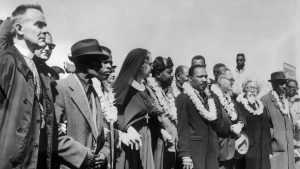Abraham Joshua Heschel (1907-1972) is an American rabbi of Polish origin. From an illustrious Hassidic family, he was born in Warsaw and grew up in a deeply pious and erudite Jewish universe. At 20 years old, in the 1930s, this young rabbi lives in Berlin where he is pursuing higher education at the Hochschule für die Wissenschaft des Judentums and at the Friedrich Wilhelm University. In 1933, he completed his doctoral thesis, during the Nazification period of Germany. In 1937, Martin Buber made him his successor in Frankfurt on the Main as co-director of the Mittelstelle für contain Floating Ideas and of the Airhouse.
In 1938 he was expelled from Germany like many Jews of Polish origin and had to return to Poland. Fleeing from Nazism, he finds refuge in England and then in New York in March 1940. In America he pursues a brilliant rabbinical career as a thinker and teacher, notably within the Hebrew Union College of Cincinnati. From 1945 he teaches at the Jewish Theological Seminary of America
From the 1960s until his death in 1972, he committed himself to inter-religious dialogue and on the political terrain, for ethical reasons intrinsic to Judaism according to him. On January 14, 1963, during the National Conference on Religion and Race, he violently denounced racism in a speech entitled "Religion and Race" (Religion and Race). It is there that he met Martin Luther King, whose friend he became. Abraham Joshua Heschel becomes an essential Jewish personality in the fight for equal civil rights in general, and in particular in favor of African American populations.
Close to Cardinal Augustin Béa, he is very active at the time of Vatican II and contributes to giving the Vatican the Jewish perspective, for the drafting of the bull Nostra Aetate.
Abraham Joshua Heschel was a bridge between the traditional world and the modern world without departing from his ethical, mystical, prophetic ideal, his admiration for Maimonides, the teachings of Hassidism. He leaves an important work in several languages.

